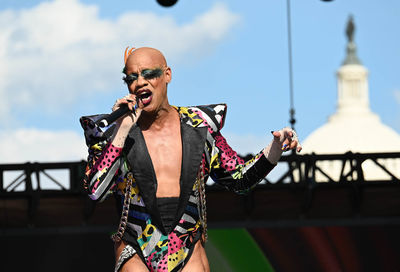‘Black Panther: Wakanda Forever’ Review: Panther’s Plight
A superhero movie missing its superhero, 'Black Panther: Wakanda Forever' compensates with a compelling villain.

Chadwick Boseman’s talent for personifying pop culture heroes with grace and humility served him (and Marvel) well in his royal role as T’Challa, Prince of Wakanda and also the nation’s fiercest protector, Black Panther.
The star’s untimely passing — and the fact he apparently walked with grace and humility in life as well as onscreen — led the Marvel brain trust and Black Panther director Ryan Coogler to the suitably gracious decision to move the franchise forward without replacing Boseman as T’Challa.
So how then to follow-up Coogler’s 2018 blockbuster, the MCU’s second-highest grossing solo superhero film, and the only MCU feature so far to garner an Oscar nomination for Best Picture?
The solemn sequel Black Panther: Wakanda Forever (★★★☆☆) launches directly into a suspenseful sequence that dramatizes T’Challa’s absence and honors Boseman’s indelible presence. The Prince’s tech wiz little sis Shuri (Letitia Wright, in the film’s anchor role) leads a frantic medical team fighting for T’Challa’s life. He “suffered in silence” with his illness, Shuri informs us, poignantly echoing real-life events.
The sudden loss sends the secretive African kingdom into mourning, centered around the Queen Mother Ramonda (Angela Bassett, as regal as ever). And Princess Shuri is thrust into a position of greater responsibility, just as Wright has been thrust into the film’s point position.
In her three previous appearances as Shuri, Wright established the character’s feisty, funny, kid sibling persona, usually via lighthearted verbal sparring with Boseman’s big bro. She also just radiated an appealing intensity that’s still brought to bear in Shuri’s expanded role.
But the circumstances necessitate a somber turn to her bright demeanor, so the audience loses the character as we’ve come to know her. Wright ably carries the story’s dramatic weight, abetted by hers and Bassett’s credible mother-daughter rapport, but the movie misses adorable sidekick Shuri, just like it misses the Black Panther.
Seemingly more committed to elaborating Oscar-caliber, post-trauma drama than delivering superhero thrills, the film is a bit stingy when it comes to eye-catching action. We do get new-to-the-MCU comic book fave Riri Williams (Dominique Thorne), a 19-year-old tech genius from the hood, who makes her debut in a semi-successful attempt to boost the movie’s sidekick and superhero mojos in one stroke.
Having created a super-suit similar to Tony Stark’s armor, Riri, a welcome, though rushed addition to Shuri and Ramonda’s inner circle, eventually emerges as Ironheart.
But Ironheart’s first film appearance, and Thorne’s likable performance, are overshadowed by the movie’s introduction of one of comic book history’s greatest antiheroes, Namor, Marvel’s mighty Sub-Mariner.
Coogler and co-screenwriter Joe Robert Cole, who also co-wrote the first Black Panther, cast Namor as their story’s villain, who acts not entirely without sympathetic motivations. They also locate his kingdom and culture within the historical spectrum of the Yucatec Mayan people, a choice that grounds the fantasy in a rich and recognizable reality.

Coogler and returning Oscar-winning duo of production designer Hannah Beachler and costume designer Ruth Carter extend their vibrantly visual world-building to include Namor’s underwater realm of Talokan and its blue-skinned, ornately garbed people.
And as Namor, Mexican TV and film star Tenoch Huerta embodies every inch of the amphibious antagonist’s strength, passion, mystery, and moral ambiguity. Unfortunately, fearsome warrior Namor, newly at odds with Wakanda, spends too much of the movie without a proper super-powered adversary.
Too bad, since the effects teams have gone to such trouble to present him as a wondrous spectacle of flight and physical prowess. He darts through the air, fluttering on winged feet as if leaping across the sky in breathtaking bounds.
The visual effects also excel in the many scenes set in thrashing seas — as with a gripping sequence of sirens serenading a ship’s crew into walking themselves overboard to a watery demise.

Death hangs over Wakanda Forever like T’Challa’s legacy looms over Shuri. The film takes her existential conflict seriously. Not totally lacking in fun, but not here just to purvey streams and toys, Wakanda Forever is a serious film about having to move on in spite of grieving.
This is still Marvel, though, so, of course, they sneak in a sure-to-be crowd-pleasing cameo from a franchise vet, and several inside jokes, like a CNN crawl reporting Ant-Man Scott Lang’s book tour for his memoir Look Out for the Little Guy. Cherish those touches of levity — they’re dear amidst the air of pain and sorrow.
Black Panther: Wakanda Forever is playing in theaters nationwide. Visit www.fandango.com.
Support Metro Weekly’s Journalism
These are challenging times for news organizations. And yet it’s crucial we stay active and provide vital resources and information to both our local readers and the world. So won’t you please take a moment and consider supporting Metro Weekly with a membership? For as little as $5 a month, you can help ensure Metro Weekly magazine and MetroWeekly.com remain free, viable resources as we provide the best, most diverse, culturally-resonant LGBTQ coverage in both the D.C. region and around the world. Memberships come with exclusive perks and discounts, your own personal digital delivery of each week’s magazine (and an archive), access to our Member's Lounge when it launches this fall, and exclusive members-only items like Metro Weekly Membership Mugs and Tote Bags! Check out all our membership levels here and please join us today!





























You must be logged in to post a comment.